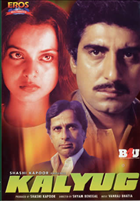Kalyug
Year: 1981
Dir: Shyam Benegal
Cast: Shashi Kapoor, Rekha, Raj Babbar, Kulbhushan Kharbanda, Anant Nag, Victor Bannerjee,
Watching Kalyug almost a quarter century later is a mixed experience. This film which was described by Ram Gopal Verma as ‘Shyam Bengegal’s best ever film’ doesn’t carry enough punch, despite its still very much relevant core theme of corporate corruption fuelled by family feuds. Benegal extrapolates the Mahabharata story into contemporary context but in trying to do justice to the ageless epic, he loses his grip on the screenplay and narrative.
The story pits two rival business houses- Puranchand industries and Khubchand industries, against each other. Puranchand is no more and his family is headed by his wife Savitri (Sushma Sethi) whereas Khubchnd is a wheel-chair-ridden invalid and his brother-in-law Bhisham (A.K.Hungal) is the acting head of family. Puranchand’s sons- a straight-forward Dharamraj (Raj Babbar), a happy-go-lucky Balraj (Kulbhushan) and a dynamic Bharat (Anant Nag) and Khubchand’s sons- a hot-headed Dhanraj (Victor Bannerjee) and an immature Sandeepraj (Akash Khurana) are all cousins but in business, they are bitter adversaries.
With the aid and advice of his best buddy Karan (Shashi Kapoor), Dhanraj wins a huge Govt. business contract- much to the consternation of the firebrand Bharat. To usurp each other, now the two rival groups start indulging into unsavoury tactics. The inevitable industrial war between the cousins starts off slowly with official complaints, industrial espionage, union takeovers, flash strikes, forced lockouts and Income Tax raids but soon turns bloody with engineered killings. With many skeletons lying in their closets, the families struggle to come to terms with the changing times and relationships.
Portraying Puranhand family as Pandavas, the Khubchand family as Kauravas and Karan as Karna is a theme which gets hampered by the obvious need to compress and encapsulate a huge epic with hundreds of characters into a script with fewer characters to fit into the two-and-a half hour long screen- time. Benegal’s usual languid style of narration gives way to a much hurried and jerky style.
The story does present a few bold and interesting touches like the Puranchand’s impotence, his wife’s ‘family-approved’ illicit relationship with a Swamiji and the ambiguous relationship between Dharam’s wife (played by Rekha) with Karan as well as with Bharat. But such is the film’s narrative that the complexity of characters is merely suggested through subtle scenes, without exploring it in real detail. Shashi Kapoor’s Karan and Anant Nag’s Bharat are the better etched characters but otherwise no performance stays in memory.
Overall, the movie lacks the sweeping vision and grandeur required to make it a real screen epic. It just manages to show the age of sin, betrayal, violence and corruption in a mere superficial manner.


